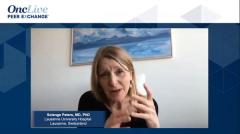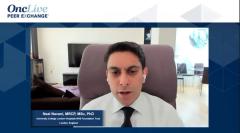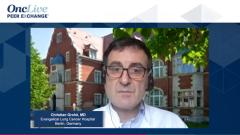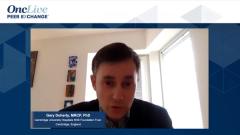
Surgical Resectability in Stage IIIA-N2 NSCLC
Christian Grohé, MD, and Gary Doherty, MRCP, PhD, consider factors that may influence the resectability of patients with stage IIIA-N2 disease, such as biomarker status, performance status, and imaging results.
Episodes in this series

Neal Navani, MRCP, MSc, PhD: I think we would all appreciate that there has been huge innovation in the treatment of early stage lung cancer. A lot of this has been driven by a stage shift, by the implementation of lung cancer screening. This is now routinely implemented in many areas around the world, and hopefully is going to be implemented in more. We know from large studies, like the NLST study in the United States and the European NELSON trial, that lung cancer screening with low-dose CT scans can significantly reduce mortality from lung cancer. Hopefully, as we see the rollout of low-dose CT screening, we will see an increase in the number of patients with early stage disease, as well as a reduction in the patients who have later-stage disease. On top of that, we have a number of otherinteresting innovations to treat early stage disease. From our surgical colleagues’ perspective, it has become increasingly common for centers to use robotic techniques for their surgeries. We have data now available that minimally invasive VATS [video-assisted thoracoscopic surgery] is associated with shorter lengths of stay than open thoracotomies.
Our radiotherapy colleagues are also making great progress in terms of optimizing radiotherapy for small peripheral lesions using stereotactic radiotherapy, and are now including virtually all patients with stage IIIA and IIIB diseases restricted to the thorax within radical radiotherapy fields. They are combining those 2 factors—the radiotherapy and the surgical factors—with systemic agents to optimize the maximal survival benefits for our patients with early stage disease. My first question in this section will be to Christian. It’s a slightly controversial question, perhaps, about that thorny issue of stage IIIA-N2 disease. How do you assess resectability for our patients with stage IIIA-N2 disease?
Christian Grohé, MD: First, I would like to discuss the patient’s overall morbidity score with the MDT [multidisciplinary team], and afterward we recommend a PET [positron emission tomography]-CT. Then it depends, is this patient, by PET-CT, on a multilevel N2 status? If so, at least by PET-CT, then we still would like to discuss the overall situation in terms of seeing if there is an option for curative intended surgery. For that reason we still do a mediastinoscopy for these patients, and we have a systemic lymph node sampling. After that specimen analysis, we decide if this is a patient who should undergo a surgical approach, or if we go in the direction of radiochemotherapy. This is a new, more detailed and personalized approach for these patients. It’s more laborious , but I think we generate a lot of information, in particular during our CT and PET-CT staging procedures, and pathology-based staging procedures. We then have more information about the patients to optimize the outcome for this special cohort.
Neal Navani, MRCP, MSc, PhD: I agree. I think the staging of these patients, as you say, is really crucial. Certainly, in the United Kingdom, our national guidelines suggest that our patients have a PET-CT, they should all have an MRI of the brain, and then, as you say, invasive mediastinal staging to be absolutely clear about which lymph nodes are involved and how many lymph nodes are involved. At what point then do you consider a patient to be irresectable, or nonoperable? Is it that anyone with N2 disease in your practice is inoperable? Or is it that you consider 1 lymph node station, or more than 1 lymph node station?
Christian Grohé, MD: We clearly decide if this is a patient whose overall performance status is good, and who is on a monolevel or bilevel N2 stage. Then we can discuss that and combine our surgical effort with the radiochemotherapy or other approaches afterward. Again, having new data, also from the PACIFIC trial about patients with EGFR mutations, we understand that, obviously, if we have more information obtained from these patients—for instance, that they harbor a driver mutation—you should consider having a completely different approach for these patients compared to patients who have no driver mutations at that stage.
Neal Navani, MRCP, MSc, PhD: That is interesting. The knowledge of a driver mutation preoperatively may influence your decision as to whether a patient is operable, given the adjuvant data we have now seen.
Christian Grohé, MD: Absolutely.
Neal Navani, MRCP, MSc, PhD: Gary, can I ask you about this point as well? If you knew the patient’s PD-L1 status, does that influence whether you think a patient with stage IIIA-N2 is operable or inoperable?
Gary Doherty, MRCP, PhD: Not at all. All this information is important for the patients, and all of these are holistic discussions; it is the patient who decides whether to undergo surgery with the full knowledge, based on the data available, presented by those who treat them. I think it is really important for these patients to have a combined clinic where they can see oncologists, radiation oncologists, and surgeons. The patient ultimately will make up their mind. But currently, it does not affect my decision whether the patient should be recommended to have a surgical resection.
Transcript Edited for Clarity





















































